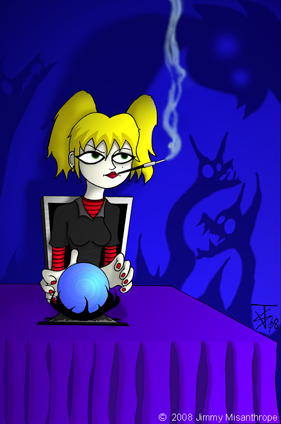Good day to you all. Today I’d like to present to you an interview I recently conducted with mister Dwight L. MacPherson, the Harvey and Eagle Award-nominated creator of Zuda Comics’
Sidewise, the critically-acclaimed
Surreal Adventures of Edgar Allan Poo, Arcana Studio’s breakthrough hit
Dead Men Tell No Tales and writer of IDW Publishing’s
American McGee’s Grimm. He’s a writer whom I greatly respect and admire for his imagination, the subject matter that he chooses to explore, his dedication to his craft, and his skill at creating well-rounded characters that resonate with readers.
I love the guy's inventive use of words and language as well, an example of which ("bumblepuppy and whirligig") is included in this very interview.
Aside from writing and editing comic books, graphic novels and webcomics he also writes short stories, poetry and young adult novels.
A busy guy indeed!
He’s also a friendly and engaging sort of fellow, and maintains a good rapport with his readers, often responding to comments people make on his online comics, blog posts and such.
And (at the time of writing) he follows 666 people on
his twitter account.
A while back I hit upon the idea to email him some interview questions (a couple of which I selfishly included purely because I was really curious to know the answers) and he was gracious enough to respond with some rather insightful and witty answers.
So let’s get into this shall we?
Chloé Kovac: Your writing strikes me as being very well thought out and structured. Do you think that your background in the military has contributed to this, in regards to having a solid work ethic and a disciplined approach to setting out a story?
Dwight L. MacPherson: Well, first off, thank you very much.
Absolutely. I learned the importance of self-discipline, time-management, professionalism, integrity, being proactive, and attention to detail (and how to kill people, so don’t mess with me) in the military. In fact, it did much more than teach me these things; they became a part of who I am. So I would say that my military background not only contributed to my approach to writing, but it made me a better, stronger, more responsible person. You can’t go wrong serving your country in the Armed Forces. I’m proud to have served—and it made me a better human being in the process. Win-win.
 CK:
CK: Do you have any particular set process/processes that you employ when getting a story together?
DLM: It starts with a concept. Sometimes it comes to me as a basic idea; sometimes it’s a partial story. Generally, I will write the idea down and save the document. If I’m buried in work, I will continue to brainstorm as I am able to—writing down anything that comes to mind in the meantime. From these basic ideas, I will put together a skeleton plot. This will provide the basis for my research, and I scour the internet and the local libraries accordingly. After I have adequate (you can never conduct too much research) research notes, I will flesh out the story in the form of a rough outline. I generate a script based upon these loose outlines, but you never know when the story will take me in a different direction. With a general idea of what the beginning, middle and ending will be, it is always exciting to watch the story develop. Sometimes the end result is a direct reflection of the outline, other times it’s something quite different.
CK: I’ve noticed you’re a writer who researches his subject matter extensively. Do you find that knowing the facts about something helps lend a more solid base to inspiring creative thinking?
DLM: Certainly! I cannot tell you how many times I learned new facts, rumours and myths about a person that provided a treasure trove of new ideas. For instance, one of the rumours I discovered: that young Harry Houdini ran away from home and joined the circus, turned into one of my favourite stories in “Kid Houdini and the Silver Dollar Misfits.” Conducting research provides a two-fold reward. You learn as you go, and it always provides new avenues for exploration.
CK: What’s your general approach to finding an artist who will be congruent to what you are attempting to achieve with a story?
DLM: “Will you work on a back-end deal?” [laughs] I’ve been blessed to work with and befriend many talented artists. When I write a book, I can see what it should look like in my mind’s eye. That makes it much easier to find the “right artist” for each book.
CK: What are your thoughts on the seemingly limitless creative potential of the digital comics medium?
DLM: I think it has a lot of potential. While I am an old-school-gotta-have-it-in-my-hands kind of bloke, I realize that there are many, many people who would rather read on their phones, computer screens and portable reading devices—and I have no problem with that. The most important thing is that people are reading.
In the near future, I think it will prove to be a profitable alternative distributor for small press creators. I don’t see traditional distribution lasting into the next century, sadly.
 CK:
CK: Speaking of the digital comics medium, your comic Sidewise was launched on Zuda on October 8th this year. Could you give us a run-down on your experiences with Zuda since Sidewise started its run?
DLM: It’s been a wonderful experience working with Zuda. Their editors are top-notch and my fellow Zuda creators are extremely supportive. In regards to production, however, the experience has been very much like any other work for hire gig I’ve had in the past.
CK: How do you rate the importance of comic creators’ personal appearances at cons and such?
DLM: On a scale of 1 to 10, I’d say a 9. Many of my compeers have landed big-time gigs simply by meeting with publishers and editors at conventions. I don’t get to many cons, sadly, and I think that is a major contributor to the fact that I haven’t been approached regarding mainstream work. Not that I’d be willing to take anything the Big Two had to offer, mind you, but I’d like to have the opportunity to write a book or two for them.
CK: What are your thoughts on the falling rate of fiction literacy? It seems that people generally don't tend to read as much as they used to.
DLM: I’m an enormous Orwell fan, but I believe Aldous Huxley got it right in Brave New World. Our society is so busy chasing the newest bumblepuppy and whirligig that we simply do not have time to devote to reading for pleasure. The delayed gratification of reading has been replaced by the instantaneous (though vacuous) satisfaction of video games, gadgets, the internet, movies and television. Huxley also feared that we would become so inundated with information that we would become passive and egotistical—which is exactly what we’ve seen in the United States. I fear that it’s only a matter of time before it becomes a global epidemic.
CK: What are some comics/webcomics that you recommend people have a read of?
DLM: Besides my own? [laughs]
There are so many wonderful webcomics out there right now. Some of my favourites are Zuda’s Bayou (
http://www.zudacomics.com/bayou), Dual (
http://www.zudacomics.com/dual) and I Rule the Night (
http://www.zudacomics.com/node/622). I also enjoy Chris Grine’s Chickenhare (
http://www.chickenhare.com/) , Howie Noel’s Tara Normal (
http://www.taranormal.com/) , Aaron Diaz’s Dresden Codak (
http://dresdencodak.com/), David Malki’s Wondermark (
http://wondermark.com/) and Kate Beaton’s Hark, A Vagrant (
http://harkavagrant.com/). My evil archnemesis Nicholas Gurewitch’s The Perry Bible Fellowship (
http://pbfcomics.com/) is one of my all-time favourites—though it pains me to say.
CK: Ah yes, the PBF, ho ho ho! That's a rather creative clusterf*ck of warped eyecandy isn't it?
OK, last question; what advice would you give to people starting out in the comics "business"?
DLM: Make comics because you love making comics. If you think you’re going to get rich in this industry, you’re mad as a bag of ferrets. Sure, there is the occasional comic book that is optioned for film, but it’s completely unrealistic given the decline of comic sales and Hollywood’s eccentricities to enter the business thinking you can make a million bucks. Do what you do and do it well, whether it’s writing, illustrating, painting, whatever, and be willing to take criticism—a lot of criticism—and learn from it. A thick skin is a must in this industry. Pansies need not apply.
***Sound advice indeed!
So there you have it folks, I hope you enjoyed reading this interview as much as I enjoyed putting it together and reading Dwight’s responses.
Be sure to check out his website
MacPherson Media for further links to his work and other online goodies.
Yours in comix,
Chloé











